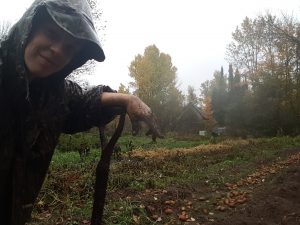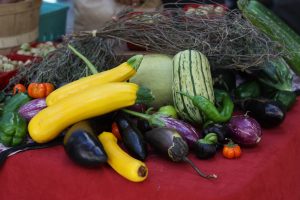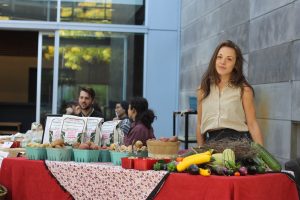Concordia farmer Elizabeth Chernichenko is bringing small-scale farming to big heights
Nearly four hours away, on the Quebec island of L’Isle Aux Allumettes, resides 26-year-old Concordia student Elizabeth Chernichenko. The island borders the Ottawa river and is home to less than 1,500 people. There, Ontario-native Chernichenko owns a small waterfront property, about two acres large. It carries a stretch of marshland, various trees, and a humus vegetable field. A variety of potato plants, beans, peppers, zucchini and herbs, among other produce, flourish on the land. Chernichenko calls it Classic Eve Gardens—her very own farm, where she is in charge of all aspects of it: from the growing and harvesting of produce, to the business aspects such as pricing and selling.
“I think that this project was an effort to do what I loved as a job—to be self-employed,” said Chernichenko. She said she wants to learn about ecology, agriculture and the business side of small-scale farming, in conjunction with her undergrad degree in human environment from Concordia. “I’d like to have a very well-rounded practical and university theoretical education,” she said. She stays at the farm Thursday through Sunday, and comes back to Montreal for school the rest of the week.
Chernichenko said she was interested in environmental issues and sustainability from a young age. She worked with environmental stewardship organizations after high school and volunteered at farms in her early adulthood. After working full-time at an organic farm last summer, Chernichenko realized how much she enjoyed farming.

“I found that I hadn’t been exhausted like I had been at other jobs, like in the service industry or in the movie industry. I could work countless hours [at the farm] and still find myself really enjoying my time and myself,” she explained. “I found out last summer for sure, that organic farming and gardening was an area that I could find my growth, knowledge-wise, entrepreneurial-wise and personally.”
With a little bit of luck and the right connection at the right time, she was able to acquire a property in L’Isle-aux-Allumettes. A co-worker at the farm where she worked was looking to give up land they had recently inherited. They asked Chernichenko if she would like to take it over, and after a long bout of thinking, she took up the opportunity and started her own business. It took over six months of planning before she moved.
“I had to prepare myself for the complete unknown. I’d never lived alone in the country before, let alone so remote,” she said. Upon telling friends and family her plans, they weren’t too optimistic. “It was a really hard thing to overcome. Very few people were supportive, either skeptical or negative about me doing it,” she said with a laugh. “I showed them.”
The Classic Eve Gardens logo features a sketch of a woman’s face, wearing a floppy hat and sunglasses. Chernichenko said the somewhat feminine look of her logo was intentional. “I wanted to say that yes, it’s a pretty little farm run by a ‘pretty little girl,’ but the products and business should speak for itself when a person looks at the fruit of labour,” she said.
Farming involves a lot of physical labour, as well as thinking outside of the box, Chernichenko said. “Farming is a career of problem-solving,” she said. “You have goals, you have a vision, and you take whatever resources you have. You have to be extremely resourceful and creative.”
Creative she has been. Chernichenko’s farm doesn’t have a water infrastructure—instead, the water is sourced naturally, from a springpool on the upper part of her property. “It was this beautiful, fresh, ground-filtered water that was coming out and pooling. It was home to a lot of frogs,” she said. Since her property is on a slope, she had the idea of creating an aqueduct to feed the water down to the plant field by digging a trench.

However, with the dry weather, the water would get absorbed. “I ended up having to put a hose in, build a dam and let gravity feed it down the line into a hole that I dug by my field. That was my water source the entire summer: good old-fashioned gravity,” she said with a laugh. For her, learning the practice of farming is largely a matter of trial and error.
While Chernichenko’s produce is organic, she hasn’t been able to afford an official organic certification—she’s still debating as to whether it’s really necessary. “I might just stick with non-certified organic,” she said. “My efforts have been organic. I think if people are cool with that, then the certification that the province does is irrelevant.”
She does not use pesticides or chemicals on her plants—instead, she physically picks the bugs off of them, which usually takes about an hour per day. “On a small scale, these things are manageable,” she said. “You do that every day, and you actually get rid of them.”
Her ultimate goal is to find a way to make small and medium-sized farms work from an economical and sustainable standpoint. “That’s my goal and dream, to see how to teach people and myself a way that it can work,” she said. “I find that you can take away a lot of the abrasive, unnatural methods [used in farming] by sizing down and being efficient and profitable on a small scale.”

Chernichenko was particularly impressed, upon coming to Concordia, with the various groups engaged in urban agriculture or advocating for food-related issues, such as food production and security. For the average student interested in food sustainability, her advice is simple: “Your money is your voting power, so it’s important to make the right decisions. Ask questions about your food.”
She has recently started a new business venture: cooperative pricing—or Pay What You Can (PWYC). For those who can’t afford to pay the full price of her goods, she’s opted to let them pay as much as they can afford to, and encourages those who can afford the products to subsidize someone else’s costs. The products range from $2.50 to about $13. This year, she harvested beans, peas, pumpkins, cucumbers, eggplants, peppers, beets, a wide variety of herbs, 24 kinds of heirloom tomatoes, and much more.
Chernichenko currently sells at three markets: Cobden Farmers Market and Eganville Farmers’ Market—both located in Ontario, and the Concordia Farmers’ Market, which takes place every Wednesday from noon to 6 p.m. in the mezzanine of the Hall Building. The market runs until the end of the semester, and resumes at the start of the winter semester. Visit Facebook to learn more about Classic Eve Gardens.





This is the future… or I should say, if we are lucky enough to have a future it will be thanks to people like Chernichenko